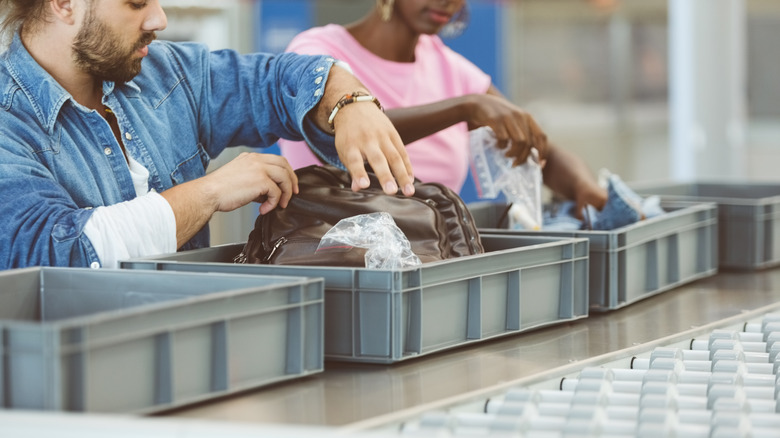Can Duty-Free Purchases Be Confiscated Before A Connecting Flight?
When traveling abroad, indulging in shopping at a duty-free airport store can be a hugely enjoyable experience. However, the last thing you want is to have your purchases confiscated before a connecting flight. Understanding the regulations surrounding duty-free items during your journey is essential to ensure a smooth and hassle-free travel experience — especially when you're potentially going through security multiple times.
While guidelines may differ between international and domestic flights, they can generally be navigated with ease. The fundamental rules remain consistent. So, if you are passing through security for your connecting flight, any liquids in your carry-on need to follow the typical TSA guidelines. Having said that, if you stay within the airport of your connecting flight and do not pass through security again, you won't need to worry about confiscation.
This distinction is important to ensure that you can enjoy your duty-free purchases without any unnecessary stress.
The rules of duty-free shopping
Generally, you can only shop in a duty-free store if you're boarding an international flight. This means you can buy your products before flying out of the country and take advantage of the reduced or exempted import duties and taxes that duty-free shopping offers. Duty-free shopping is typically available in the departure area of international airports, allowing travelers to purchase goods at a lower cost compared to buying them within the destination country.
With this, there are certain things you want to keep in mind like specific country policies. For instance, the US Customs and Border Protection mentions that "the articles you purchased in [a] customs duty-free shop, whether in the United States or abroad, will be subject to customs duty upon entering your destination country."
One example is when you're traveling internationally and have a layover in another country before reaching your final destination. In this case, you might need to go through customs and immigration again. Some countries have strict regulations about what can be brought into their territory, even if the items were purchased duty-free. In such cases, duty-free items might be subject to confiscation if they don't meet the country's import regulations.
Be aware of domestic regulations
For domestic connecting flights, the rules regarding duty-free items are generally less stringent. However, if you have liquid items that exceed the standard volume restrictions (typically 3.4 ounces or 100 milliliters) in your carry-on, they might be confiscated during security screening for being over the limit. Thus, if you're picking up your checked bags before connecting, you should consider placing them in there for safekeeping before going through security.
Keep in mind that this would apply when traveling from a different country to the US and then to another US state because you must go through security, too. Also, ensure you follow Customs and Border Protection rules, including that your purchases don't exceed $800 when entering the US. Overall, in order to avoid any potential confiscation by TSA or confusion, make sure to check the duty-free regulations at your specific airport and/or the country you'll be entering.
There are potential drawbacks to duty-free shopping
Duty-free shopping may look like a steal but it's not always the best way to go. Comparing prices is something that you should definitely do before impulse buying a bunch of goodies. Most travelers automatically assume that duty-free items are cheaper when that's often not true. Even though you may not be subject to typical taxes, the prices can fluctuate and vary due to other import duties.
This means that there is no guarantee that buying duty-free will save you money. Big purchases such as alcohol or perfume can be bargains, but they can get you with overpriced foods and clothing items. Even though the overpriced items may seem small, things quickly add up and if you do not check the prices beforehand, you may not be getting as good of a deal as you think.
Having said that, it is worth noting that duty-free shopping can still yield good deals. Ultimately, taking advantage of it can add a delightful touch to your travels, therefore ensuring you can hold onto your new goodies will make the experience even more rewarding.



